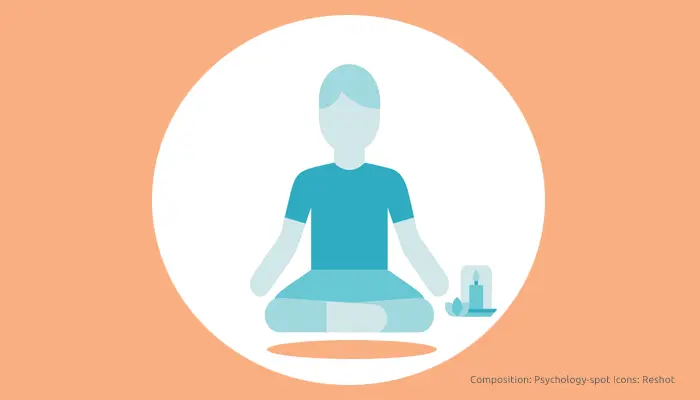
Maybe you enjoy cleaning at home. Maybe you don’t. Perhaps for you it is one of those unavoidable and tedious tasks that you cannot escape from. In any case, you could assume this daily task from a completely different perspective that allows you convert each of these small acts of cleanliness into opportunities to clear your mind and find inner peace.
Cleaning the house as an opportunity to clear your mind
Tulku Thondup, a monk who lived in Tibet, India and the United States, devoting much of his life to translating and interpreting ancient texts of Tibetan Buddhism, explains that cleaning the monastery is one of the daily spiritual tasks that he performs, as well as meditation.
“If we understood the virtue, the merit and the purpose of cleaning, we would be able to appreciate the task as a privilege instead of taking it as a burden. It will cease to seem like a dirty job and will become an opportunity to practice meditation in a unique way. It could even become an incredible source of benefits, and a way to grow in spiritual, mental and emotional strength.”
Therefore, cleaning consciously your home can be an opportunity to clear your mind, strengthen your concentration, meditate while moving with a mindfulness attitude and even grow spiritually. How to clear your mind cleaning?
- Assume the task with the right attitude. Thondup explains that “If you are meditating on generosity and someone knocks on your door and asks for your help, you cannot say, ‘You are bothering my meditation.’ Instead, we should consider that interruption as a golden opportunity to practice generosity. In the same way, when you face the task of cleaning, you should not think ‘What a disaster, everything is full of dust!’ or ‘What an annoyance to have to clean up again!’ We should assume a different attitude by saying: ‘Now I am going to clean, while I do it I have the opportunity to relax mentally'”.
- Focus only on cleaning. When you start to clean, keep your mind from wandering or concentrating on worries, disorder and confusion. Keep it focused on the here and now, on the movements you make. It is a powerful exercise of mindfulness meditation that enhances the feeling of peace. A little trick is to “Clean up as we see ourselves as if we were acting in a dream. We must approach cleanliness as if everything were unreal”, recommends Thondup. That attitude will allow you to feel calmer, perform smoother movements and, finally, merge better with the environment. It is also essential not to let your mind run too much while you clean, thinking about all the tasks that lie ahead because that will generate a state of anxiety and stress that will take you away from your goal.
- Start in silence. “If we start in silence, surrounded by calm, when the vegetation and the people around us still sleep, our heart will feel at peace, and our mind will be clear”, explains Thondup. Therefore, it is recommended to start cleaning early in morning.
- Let the air circulate. Before you start cleaning, open the windows and let the air circulate throughout the house. The pure air will fill you with energy and help you face cleanliness in a better mood.
- Clean the objects with care and affection. Thondup considers that “Those who don’t care for the objects, don’t care for people either”, because they forget that behind each thing is the work of someone. Cleaning the objects carefully shows respect and gratitude towards that work and the person who performed it.
- Feel gratitude towards the things that served you. If you are doing a deep cleaning in order to eliminate things and find it difficult to get rid of some, a small farewell ritual will help you. It is simply to thank for the service they provided. This way you will avoid that feeling of guilt that often appears when you throw away an object.
- Share the cleaning task with the rest of the family or the people with whom you share the house. In this way you will learn to value the work of others and understand that we depend on each other.
The story of the arhat who found enlightenment through cleansing
Chulapanthaka was one of the 16 arhat chosen by Buddha, but before reaching enlightenment he had to go a long way. It is said that Chudapanthaka was not able to learn or memorize the Buddhist teachings, so the Sangha, the monks who formed the temple community, decided that he could not remain there.
When Chudapanthaka was asked to leave the temple, he became very sad. Buddha passed by, saw him cry and asked his disciples what had happened. He took pity on him and asked the Sangha to let him in the temple, even if he had to do other jobs.
Chudapanthaka was ordered to clean the sandals of the monks. However, he felt happy because he continued to live in the temple and, while cleaning, could continue on his personal growth. One day, he wondered if the dust he was removing from the sandals was really the dust of the earth or the dust of desire. That seemingly simple question led him to enlightenment, everything made sense in his mind and he became one of the arhat.
This story is particularly illuminating because it encloses the feeling of Buddhism: the idea that we can find wisdom anywhere and through less imagined means. Thondup summed it up perfectly:
“When we mature in the practice of meditation, any place, anywhere, can become a temple (…) A temple is not a reserved space, it can be anywhere. Our own body can become a temple, because the word temple really means a place to exercise consciousness, peace and tranquility.”
Or what is the same, we can take advantage of any occasion to complain about life, or assume it as a wonderful miracle of life. The choice is up un us!.



